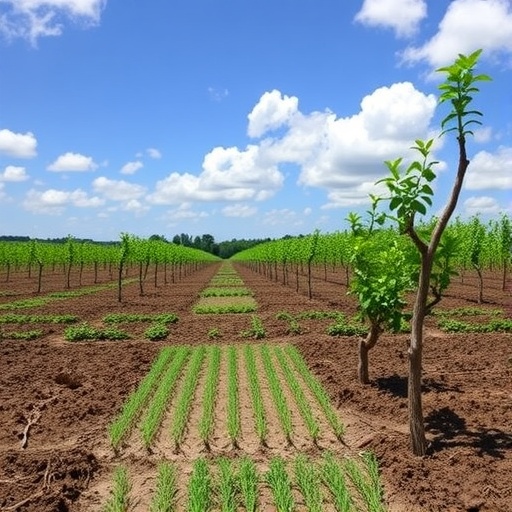In the midst of an accelerating global climate crisis and increasing demands on agricultural production, a novel framework known as agricultural environmental ethics is rapidly gaining prominence. This emerging interdisciplinary field offers profound insights into understanding and addressing sustainability challenges that conventional approaches have struggled to solve. At its core, agricultural environmental ethics invites stakeholders—from scientists and policymakers to farmers and consumers—to reconsider the moral foundations of agricultural practices, shifting the discourse toward a more holistic, ethically grounded model of sustainability.
Agriculture remains humanity’s primary interface with the natural environment, influencing critical factors such as soil health, biodiversity, water quality, and greenhouse gas emissions. However, traditional agricultural systems often prioritize short-term yields and economic gains over long-term ecological integrity and social justice. Environmental ethics, a branch traditionally concerned with moral relations between humans and the non-human world, when applied to agriculture, examines the ethical responsibilities of those who produce and consume food towards ecological systems and future generations.
A pivotal element in this discourse is the tension between anthropocentric and ecocentric ethical paradigms. The anthropocentric worldview places human benefits at the forefront, often justifying intensive agricultural methods that can degrade ecosystems. Conversely, an ecocentric ethic argues for intrinsic value in non-human components of agroecosystems, such as soil microorganisms, pollinators, and native flora, advocating for agricultural practices that maintain ecological balance. Agricultural environmental ethics bridges these perspectives by suggesting integrated models that account for human needs without compromising ecological thresholds.
Recent advances in sustainable agriculture have demonstrated that ethical considerations can directly inform innovative technological and managerial strategies. Techniques such as agroecology, regenerative farming, and precision agriculture show promise not only as productivity tools but as ethical frameworks that honor complexity and diversity within farming landscapes. These strategies aim to restore ecosystem services, reduce chemical inputs, enhance carbon sequestration, and promote equitable access to resources, thus aligning agricultural outcomes with broader societal values.
Moreover, agricultural environmental ethics introduces critical reflections on social dimensions, including the rights and dignities of farmworkers, community food sovereignty, and the presence of indigenous knowledge systems. Ethical approaches compel a reassessment of power dynamics in agricultural supply chains, urging equitable distribution of benefits and responsibilities. In this light, sustainability is not merely ecological resilience but a multifaceted concept encompassing social justice and cultural sustainability embedded within agricultural endeavors.
Ethical frameworks also challenge regulatory and policy paradigms, advocating for standards and incentives that cultivate responsible stewardship rather than reactive compliance. Policies influenced by agricultural environmental ethics encourage proactive engagement with ecological uncertainties, precaution in the deployment of novel biotechnologies, and transparent stakeholder participation. Such policies elevate the role of ethics beyond theoretical debates into actionable governance mechanisms that shape agricultural futures.
The implications for food security are profound. Ethical agriculture prioritizes diverse cropping systems and localized food networks that reduce dependency on vulnerable global supply chains. It recognizes that food security is intrinsically linked to ecosystem health and community well-being. By embedding ethical considerations into production and distribution, agricultural environmental ethics seeks to ensure that future generations inherit not only sufficient food but resilient landscapes and social structures.
An innovative aspect of this emerging field is its interdisciplinary nature, synthesizing philosophy, ecology, agronomy, economics, and sociology. This convergence facilitates novel methodologies that quantify ethical impacts as part of sustainability assessments, integrating moral values with empirical data. For example, new metrics evaluate biodiversity conservation, soil carbon content, and social empowerment alongside traditional yield and profit indicators, providing a holistic picture of agricultural sustainability.
Educational initiatives reflecting agricultural environmental ethics are also expanding, aiming to equip the next generation of agricultural professionals with ethical reasoning skills alongside technical knowledge. By fostering an ethical mindset, educational programs encourage reflective decision-making that appreciates the interconnectedness of natural and social systems inherent in agriculture.
Challenges persist in operationalizing agricultural environmental ethics due to competing interests, entrenched industrial practices, and the complexity of ethical dilemmas in real-world scenarios. Reconciling short-term economic pressures with long-term sustainability goals requires continual negotiation and adaptive governance frameworks sensitive to context and scale. However, the growing body of literature and practice-based evidence underscores the viability and necessity of this ethical turn.
Global initiatives promoted by governments, NGOs, and international bodies increasingly recognize the importance of ethical considerations in promoting sustainable agriculture. These efforts encourage collaboration across sectors and borders, fostering shared values and collective action. Agricultural environmental ethics thus serves as a lingua franca to unite diverse actors around common sustainability objectives grounded in ethical commitments.
Emerging research also highlights the role of technology in complementing ethical agriculture rather than replacing moral responsibility. Digital tools, sensors, and artificial intelligence can optimize resource use and minimize environmental footprints but require ethical governance to prevent exacerbating inequalities or environmental harm. This interplay between technology and ethics exemplifies the contemporary challenges and opportunities within sustainable agricultural development.
In summary, agricultural environmental ethics is transforming the sustainability discourse by embedding ethical reflection into the heart of agricultural science and practice. Its holistic ethos encourages a balance of human needs, ecological integrity, and social justice, offering a promising pathway through the complex challenges of food production in a changing world. As ethical frameworks evolve, they promise to inspire innovative solutions that transcend the limitations of conventional sustainability paradigms and guide agriculture toward a resilient and equitable future.
Subject of Research: Agricultural environmental ethics and its application to sustainability challenges in agriculture.
Article Title: Agricultural environmental ethics: an emerging way to understand and solve sustainability challenges.
Article References:
Congreves, K.A. Agricultural environmental ethics: an emerging way to understand and solve sustainability challenges. npj Sustain. Agric. 3, 28 (2025). https://doi.org/10.1038/s44264-025-00071-3
Image Credits: AI Generated




